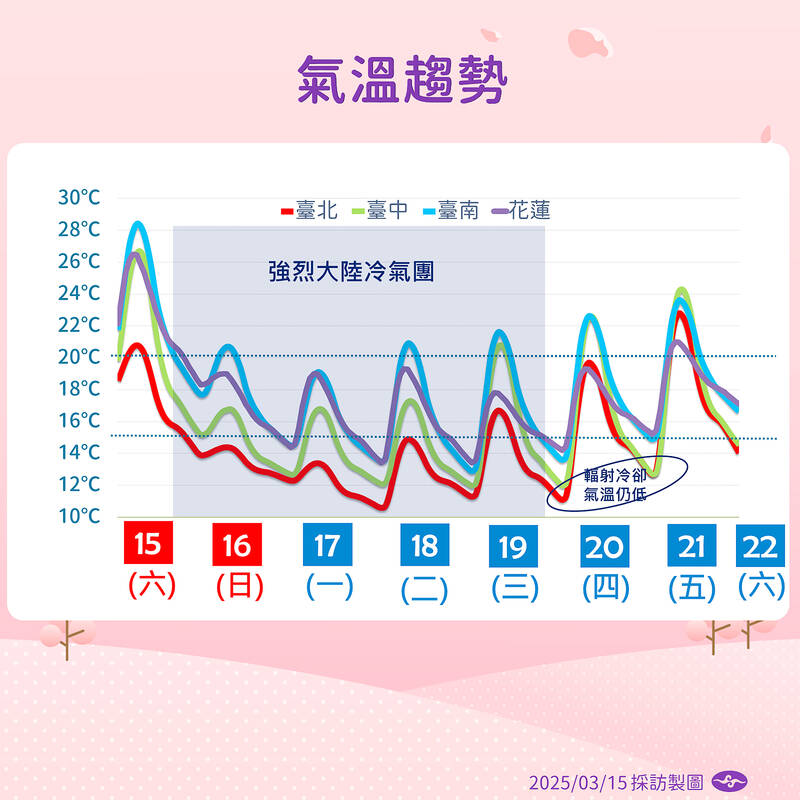A strong cold air mass could push temperatures in parts of northern Taiwan down to single digits this week, the Central Weather Administration (CWA) said.
Daytime temperatures yesterday ranged from 22°C to 26°C in northern and northeastern Taiwan, and fell to 15°C to 16°C at night, while highs in central and southern Taiwan hit 28°C to 31°C before falling to 18°C to 22°C at night, the CWA said yesterday.
However, due to the effects of the continental cold air mass, temperatures are forecast to dip to 10°C to 18°C in northern and northeastern Taiwan, 12°C to 20°C in central Taiwan, 14°C to 24°C in the south, and 14°C, to 23°C in the east today and tomorrow, it said.

Photo provide by the Central Weather Administration
Temperatures are expected to fall further from Tuesday to Thursday due to the cold air mass coupled with a radiative cooling effect, the CWA said, referring to the cooling of the ground under clear skies, light winds and dry conditions.
The mercury is expected to dip to 9°C in the north, 11°C in central Taiwan, and 13°C in the south, and dry weather is expected during the cold spell, it said.
Meanwhile, the leading edge of the cold air mass reached northern Taiwan yesterday morning, bringing intermittent rain and thunderstorms across the nation, while there were also regional showers in the north, it said.
A heavy rain advisory was issued yesterday for Keelung, Taipei, New Taipei City, Taoyuan and Hsinchu City, as well as Hsinchu and Miaoli counties, indicating 24-hour accumulated rainfall would exceed 80mm or hourly rainfall would exceed 40mm.
There were also showers in mountainous areas in the east and parts of central and southern Taiwan. The weather is expected to turn dry and colder today, it said.
The cold air mass is expected to weaken on Friday, when temperatures would begin to rise again, it said.

‘ABUSE OF POWER’: Lee Chun-yi allegedly used a Control Yuan vehicle to transport his dog to a pet grooming salon and take his wife to restaurants, media reports said Control Yuan Secretary-General Lee Chun-yi (李俊俋) resigned on Sunday night, admitting that he had misused a government vehicle, as reported by the media. Control Yuan Vice President Lee Hung-chun (李鴻鈞) yesterday apologized to the public over the issue. The watchdog body would follow up on similar accusations made by the Chinese Nationalist Party (KMT) and would investigate the alleged misuse of government vehicles by three other Control Yuan members: Su Li-chiung (蘇麗瓊), Lin Yu-jung (林郁容) and Wang Jung-chang (王榮璋), Lee Hung-chun said. Lee Chun-yi in a statement apologized for using a Control Yuan vehicle to transport his dog to a

Taiwan yesterday denied Chinese allegations that its military was behind a cyberattack on a technology company in Guangzhou, after city authorities issued warrants for 20 suspects. The Guangzhou Municipal Public Security Bureau earlier yesterday issued warrants for 20 people it identified as members of the Information, Communications and Electronic Force Command (ICEFCOM). The bureau alleged they were behind a May 20 cyberattack targeting the backend system of a self-service facility at the company. “ICEFCOM, under Taiwan’s ruling Democratic Progressive Party, directed the illegal attack,” the warrant says. The bureau placed a bounty of 10,000 yuan (US$1,392) on each of the 20 people named in

The High Court yesterday found a New Taipei City woman guilty of charges related to helping Beijing secure surrender agreements from military service members. Lee Huei-hsin (李慧馨) was sentenced to six years and eight months in prison for breaching the National Security Act (國家安全法), making illegal compacts with government employees and bribery, the court said. The verdict is final. Lee, the manager of a temple in the city’s Lujhou District (蘆洲), was accused of arranging for eight service members to make surrender pledges to the Chinese People’s Liberation Army in exchange for money, the court said. The pledges, which required them to provide identification

INDO-PACIFIC REGION: Royal Navy ships exercise the right of freedom of navigation, including in the Taiwan Strait and South China Sea, the UK’s Tony Radakin told a summit Freedom of navigation in the Indo-Pacific region is as important as it is in the English Channel, British Chief of the Defence Staff Admiral Tony Radakin said at a summit in Singapore on Saturday. The remark came as the British Royal Navy’s flagship aircraft carrier, the HMS Prince of Wales, is on an eight-month deployment to the Indo-Pacific region as head of an international carrier strike group. “Upholding the UN Convention on the Law of the Sea, and with it, the principles of the freedom of navigation, in this part of the world matters to us just as it matters in the